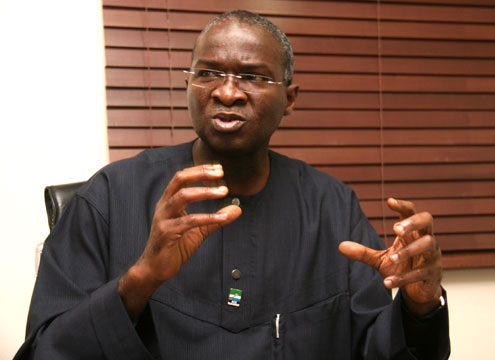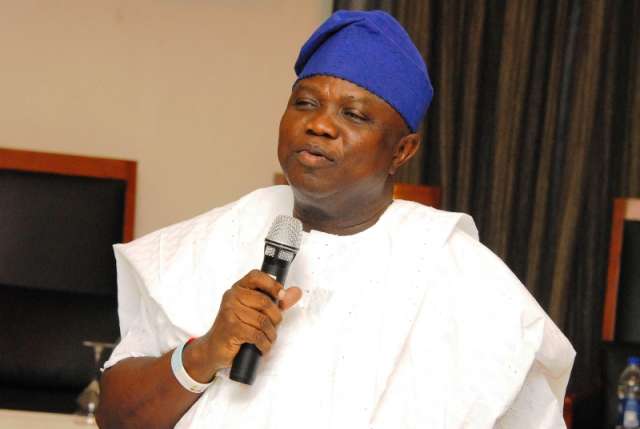 Nigeria’s Minister of Power, Works and Housing, Babatunde Fashola, on Monday said he was not afraid of going to the law court over allegations of preferential treatment offered two power generating companies.
Nigeria’s Minister of Power, Works and Housing, Babatunde Fashola, on Monday said he was not afraid of going to the law court over allegations of preferential treatment offered two power generating companies.
Mr. Fashola made this known at the 25th Monthly Meeting with Operators in the Power Sector hosted by Ibom Power at the Ibom Hall, IBB Way, Uyo, Akwa Ibom State on Monday.
The minister was reacting to suit filed by the power generating companies (GENCOs) last week.
GENCOs had on March 6 sued the Nigerian government for alleged discriminatory treatment of the companies and their gas suppliers with intent to harm their business interests.
The GENCOs, in their suit, also accused the government of conferring preferential treatment on Azura Power West Africa Limited and Accugas Limited to the detriment of the Nigerian Electricity Supply Industry and the power sector as a whole.
Azura Power West Africa Limited is the operator of Azura-Edo, Nigeria’s largest independent power plant (IPP) exposed for suspicious use of offshore funds in the infamous Paradise Papers global investigation.
The suit filed at the Federal High Court, Abuja, has the GENCOs represented by Mainstream Energy Solutions Limited (“Mainstream”), Transcorp Power Limited (“Transcorp Power”), Egbin Power Plc (“Egbin”) and Northsouth Power Company Limited (“Northsouth”) as the plaintiffs in the suit.
The defendants were named as the Federal Government of Nigeria (1st defendant), Central Bank of Nigeria (2nd defendant), Minister of Power, Works & Housing (3rd defendant), Nigeria Bulk Electricity Trading Plc, NBET, (4th defendant), Azura Power West Africa Limited (5th defendant) and Accugas Limited (6th defendant).
On Monday, Mr. Fashola said while they have the right to go to court, GENCOs should be concerned about the court of public opinion.
“Lately, I have read reports that some Generation Companies (GenCos) (not Ibom Power) have gone to court, filing claims against the government. That is their right and their prerogative. It is better than self-help, and it is consistent with the rule of law, which underpins our democracy,” he said.
“While they seek refuge in a court of law, they must be ready to face scrutiny in the court of public opinion. The court of public opinion is a court of conscience and morality. In the court of public opinion, they must be ready to tell the citizens how they felt when other groups went to court to stop the implementation of tariffs approved by NERC in 2016.
“They must explain to this public court whether they went to court before government approved a N701 Billion payment Assurance Guarantee to pay their monthly power bills. They must disclose to this court that they owed debts, from the pre-Buhari era, because their income had reduced to less than 50 per cent.
“They must disclose to this court that they now receive about 80 per cent income, and that this Government is now paying them revenues collected from international customers from the Republics Benin, Niger and Togo, in Dollars, as against the Naira payment they used to receive.”
The minister argued that in both courts, the GENCOs must disclose how they felt when some DisCos went to court to stop the enforcement of Provision of Promissory Notes, which was a condition that denied them access to the CBN low interest loans.
He said, “They must tell the court of public opinion that the reason for going to court is because Government is making 100 per cent payment to a new GenCo who has a different contract with a Partial Risk Guarantee, which they do not have. They must also disclose to both courts that they held a meeting with government and tabled their demands, which government promised to look into one week before they went to court.
“They must, in good conscience, tell the two courts whether one week was enough time, to go to court and whether this action at the time when the sector is making progress does not suggest an intention to blackmail government and hold the citizens hostage.”
Mr. Fashola also alleged that the GENCOs are planning to disrupt energy supply to sabotage government efforts.
“Let me say very clearly to all operators that I get reports of many of the clandestine meetings that some of them are holding with a view to disrupt supply for political capital,” he said.
“I will close by imploring those that are truly ready to run the business they have acquired voluntarily to continue to do so with the assurance of government support and partnership. As for those who entered the business without understanding it, please brace up for hard work and help us rebuild this country.
“Those who choose to hide temporarily in the courts of law can do so, but the court of public opinion will scrutinise you and its verdict may be very scathing, unkind, and enduring. I say this because you may not have noticed that Nigerians are increasingly taking their destiny in their hands.
“This is the essence of privatisation. If you bother to look up and around you, you will see solar panels on rooftops. The mini grid regulations allow them to procure 1MW without license. This is bigger than what many traditional generators supply. There is no law that compels them to take public power.
“I am not afraid of the law courts, and will meet you there to vigorously defend our position.”
Source: premiumtimes














